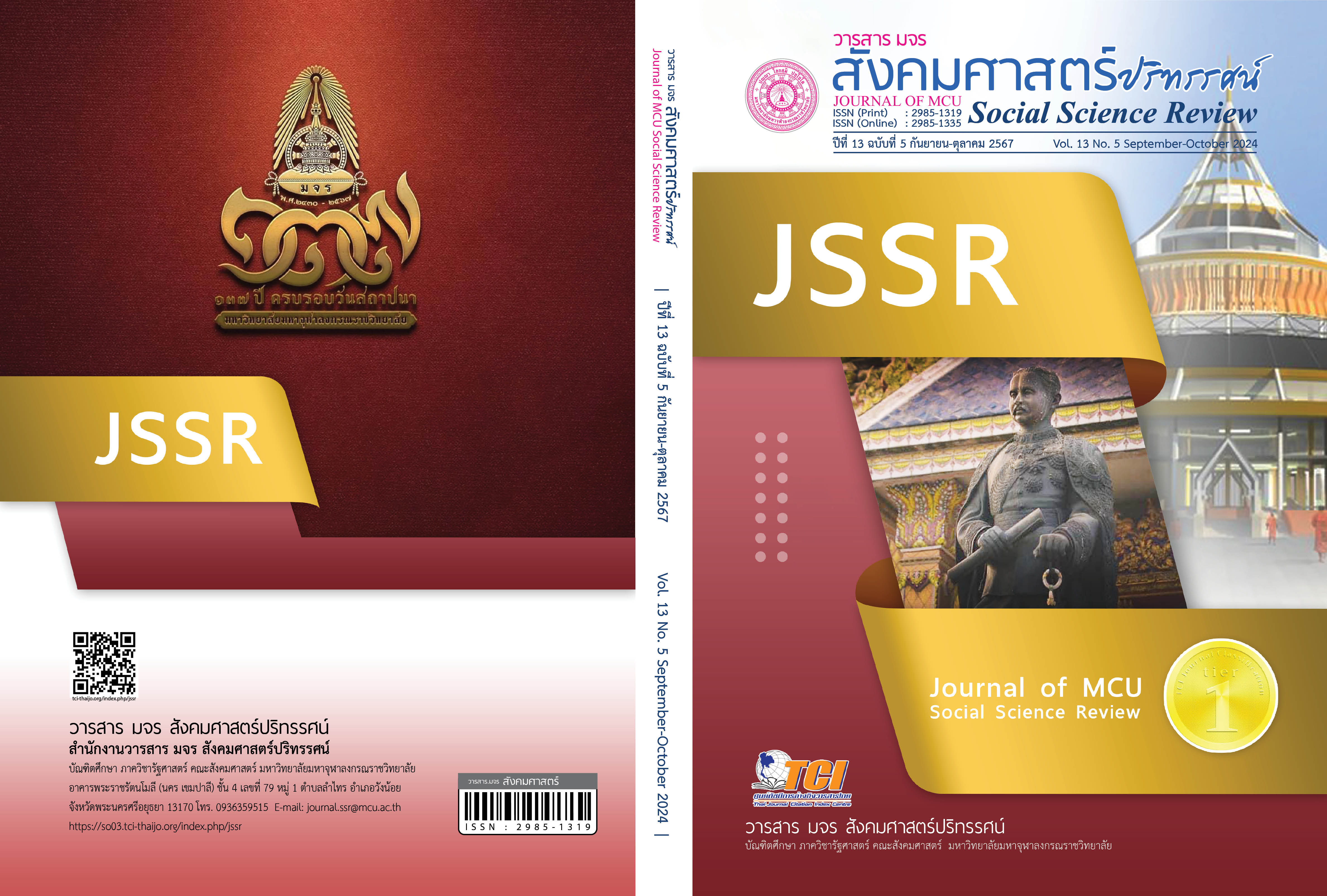นโยบายการส่งเสริมการเลี้ยงโคอเมริกันบราห์มันพันธุ์แท้ของเกษตรกรไทย
คำสำคัญ:
นโยบายการส่งเสริม, การเลี้ยงโคอเมริกันบราห์มันพันธุ์แท้, เกษตรกรไทยบทคัดย่อ
บทความวิจัยนี้มีวัตถุประสงค์ 1. ศึกษานโยบายการส่งเสริมการเลี้ยงโคอเมริกันบราห์มันพันธุ์แท้ในประเทศไทย 2. ปัจจัยที่ส่งผลต่อการเลี้ยงโคอเมริกันบราห์มันพันธุ์แท้ และ 3. แนวทางการส่งเสริมการเลี้ยงโคอเมริกันบราห์มันพันธุ์แท้ในประเทศไทย การวิจัยนี้เป็นการวิจัยเชิงคุณภาพ ผู้ให้ข้อมูลสำคัญเป็นผู้ที่มีส่วนเกี่ยวข้องกับการเลี้ยงโคอเมริกันบราห์มันใน 5 ภูมิภาคของประเทศไทย จำนวน 25 คน เครื่องมือที่ใช้ในการวิจัย คือ แบบสัมภาษณ์เชิงลึก และวิเคราะห์ข้อมูลเชิงเนื้อหา
ผลการวิจัยพบว่า 1. ในประเทศไทยยังไม่มีนโยบายส่งเสริมการเลี้ยงโคอเมริกันบราห์มันพันธุ์แท้โดยตรง มีเพียงนโยบายที่เกี่ยวกับโคเนื้อ โคนม และโคขุนเท่านั้น 2. ปัจจัยที่ส่งผลต่อการเลี้ยงโคอเมริกันบราห์มันพันธุ์แท้ มีอยู่ 5 ปัจจัย ได้แก่ 1. ระบบการเลี้ยงโค 2. การเลือกอาหารและการให้อาหารโค 3. โรคที่สำคัญและการสุขาภิบาลโค 4. การขยายพันธุ์เพื่อเพิ่มผลผลิตโค 5. ตลาดโค และ 3. แนวทางการส่งเสริมการเลี้ยงโค พบว่า รัฐบาลควรมีการกำหนดนโยบายที่เกี่ยวข้องกับการส่งเสริมการเลี้ยงโคอเมริกันบราห์มันพันธุ์แท้โดยตรงไม่ว่าจะเป็นเรื่องการพัฒนาการเลี้ยงโค ด้านพันธุกรรม วัคซีน รวมถึงการรวมกลุ่มของเกษตรกรรุ่นใหม่ และการเชื่อมโยงตลาดโค เป็นต้น
เอกสารอ้างอิง
นราธิป ศรีพั้ว และภาณุพันธุ์ ประภาติกุล. (2560). ความต้องการการส่งเสริมการเลี้ยงโคเนื้อของเกษตรกรในจังหวัดมหาสารคาม. วารสารเกษตรพระวรุณ, 14(1), 104-112.
ประอรพิต กัษฐวัฒนา. (2563). เรื่องเนื้อ ๆ ที่ควรรู้แบบเน้น ๆ เพื่อพัฒนาอุตสาหกรรมการผลิตโคเนื้อไทยให้โกอินเตอร์แบบถูกทาง. สืบค้น 9 กรกฎาคม 2563, จาก https://shorturl.asia/Wbjsk
มงคล เตชะกำพุ และสุพิชฌาย์ แก้วมา. (2560). โคชน วัฒนธรรมแดนใต้มุมมองของนักวิชาการด้านระบบสืบพันธุ์. สืบค้น 25 มกราคม 2565, จาก https://shorturl.asia/QDWbv
วราดวง สมณาศักดิ์ และประยูร อิมิวัตร์. (2565). การเสริมสร้างและพัฒนาทายาทเกษตรกรรุ่นใหม่ตามแนวทางเกษตรทฤษฎีใหม่ อำเภอแม่ฟ้าหลวง จังหวัดเชียงราย. วารสารนิติรัฐกิจ และสังคมศาสตร์, 6(1), 187-205.
วีรชน ชูเสือหึง และคณะ. (2563). การขยายสายพันธุ์โคชนในชุมชน : กรณีศึกษาชุมชนหนองเพ็งกรอ ตำบลเสือหึง อำเภอเชียรใหญ่ จังหวัดนครศรีธรรมราช. มจร เพชรบุรีปริทรรศน์, 4(1), 15-28.
สมนึก ลิ้มเจริญ และคณะ. (2562). แนวทางการส่งเสริมการผลิตโคเนื้อในพื้นที่ 3 จังหวัดชายแดนภาคใต้. วารสารมหาวิทยาลัยนราธิวาสราชนครินทร์, 11(1), 149-161.
สืบพงศ์ สุขสม. (2560). ระบบเศรษฐกิจชุมชนกับความสมดุลของป่าพรุ. วารสารวิชาการมหาวิทยาลัยนอร์ทกรุงเทพ, 6(2), 110-117.
สุพจน์ ศรีนิเวศน์ และปิยศักดิ์ สุวรรณี. (2562). รู้จัก วัวบราห์มัน ในประเทศไทยให้มากขึ้น. สืบค้น 25 มกราคม 2565, จาก https://shorturl.asia/Tdq4J
สุรีย์พร แสงวงศ์, และคณะ. (2563). การศึกษาสภาพการเลี้ยง การประเมินปัญหาและโอกาสในการผลิตโคเนื้อคุณภาพของเกษตรกรจังหวัดแพร่. วารสารเกษตรพระจอมเกล้า 2563, 38(2), 254-262.
อำพันธุ์ เวฬุตันติ. (2560). แนวทางการส่งเสริมการผลิตโคเนื้อให้เพียงพอต่อการบริโภคในภาคตะวันออก (รายงานการวิจัย). กรุงเทพฯ: วิทยาลัยป้องกันราชอาณาจักร.
Pramana, H. P. et al. (2021). Digital marketing as a strategy for fulfilling Eid Al-Adha beef cattle: A case study of start-up companies. Retrieved May 20, 2022, from https://shorturl.asia/7QkKO
Wang, J. H. (2014). Recruiting Young Farmers to Join Small-Scale Farming: A Structural Policy Perspective. Korea: Jeonju.
ดาวน์โหลด
เผยแพร่แล้ว
รูปแบบการอ้างอิง
ฉบับ
ประเภทบทความ
สัญญาอนุญาต
ลิขสิทธิ์ (c) 2024 วารสาร มจร สังคมศาสตร์ปริทรรศน์

อนุญาตภายใต้เงื่อนไข Creative Commons Attribution-NonCommercial-NoDerivatives 4.0 International License.
เพื่อให้เป็นไปตามกฎหมายลิขสิทธิ์ ผู้นิพนธ์ทุกท่านต้องลงลายมือชื่อในแบบฟอร์มใบมอบลิขสิทธิ์บทความให้แก่วารสารฯ พร้อมกับบทความต้นฉบับที่ได้แก้ไขครั้งสุดท้าย นอกจากนี้ ผู้นิพนธ์ทุกท่านต้องยืนยันว่าบทความต้นฉบับที่ส่งมาตีพิมพ์นั้น ได้ส่งมาตีพิมพ์เฉพาะในวารสาร มจร สังคมศาสตร์ปริทรรศน์ เพียงแห่งเดียวเท่านั้น หากมีการใช้ภาพหรือตารางหรือเนื้อหาอื่นๆ ของผู้นิพนธ์อื่นที่ปรากฏในสิ่งตีพิมพ์อื่นมาแล้ว ผู้นิพนธ์ต้องขออนุญาตเจ้าของลิขสิทธิ์ก่อน พร้อมทั้งแสดงหนังสือที่ได้รับการยินยอมต่อบรรณาธิการ ก่อนที่บทความจะได้รับการตีพิมพ์ หากไม่เป็นไปตามข้อกำหนดเบื้องต้น ทางวารสารจะถอดบทความของท่านออกโดยไม่มีข้อยกเว้นใดๆ ทั้งสิ้น





